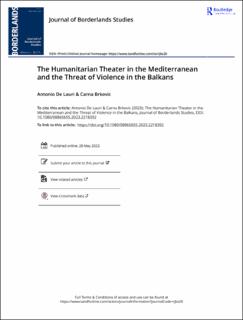The Humanitarian Theater in the Mediterranean and the Threat of Violence in the Balkans
Journal article, Peer reviewed

Permanent lenke
https://hdl.handle.net/11250/3083930Utgivelsesdato
2023-05-01Metadata
Vis full innførselSamlinger
- Publications [1488]
Originalversjon
in Journal of Borderlands Studies pp. 1-20 10.1080/08865655.2023.221839210.1080/08865655.2023.2218392
Sammendrag
This article compares the Mediterranean and the Balkan routes of migration into the European Union, exploring the (in)visibility and (un)knowability of the management of European borderlands. It offers a historical overview of the hotspot approach in the Mediterranean, where securitarian concerns merged with humanitarian affects, making certain practices and subjectivities possible, but foreclosing others. Lampedusa, Italy, has been turned into a stage where “humanitarian theater” performed for European audiences has become a crucial aspect of border management. The strategy of EU border management has been different in the Balkans, where the use of violence has been concealed with a veil of official denial. Instead of a humanitarian theater, in the Balkans we can find stories of border terror, official denial of such violence, and competing claims to knowledge about it. This official denial has kept “Europe” as a political community simultaneously implicated in and innocent of the use of violence in border management. Despite their differences, the key functions of the EU border regime have been the same in these two regions. The comparative perspective illustrates the different strategies the European border regime uses to manage the perceived “crisis” of migration, while simultaneously keeping the liberal space of Europe “safe.”
Serie
Journal of Borderlands StudiesJournal of Borderlands Studies